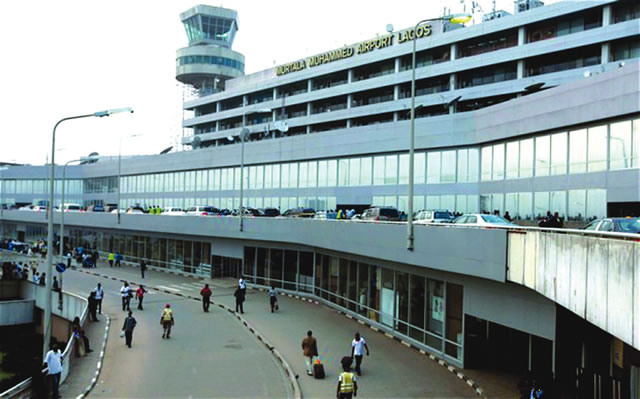In a clarion call to bolster Nigeria’s economic self-reliance and industrial capacity, the Manufacturers Association of Nigeria (MAN) has urged the Federal Government to prioritize locally produced materials for the ongoing perimeter fencing and security surveillance project at Murtala Mohammed International Airport in Lagos. The appeal, articulated in a statement issued on Monday, August 25, 2025, by MAN’s Director-General, Segun Ajayi-Kadir, underscores the critical importance of adhering to the Nigeria First Policy and Executive Orders 003 and 005, which mandate the preference for locally manufactured goods and services in public procurement. This call to action reflects MAN’s commitment to fostering domestic production, creating jobs, conserving foreign exchange, and enhancing national security through industrial self-reliance.
The statement highlights the capacity of Nigerian manufacturers to deliver high-quality fencing materials that meet or exceed international standards, challenging the notion that foreign products are inherently superior. By advocating for the use of locally produced materials, MAN aims to ensure that the economic benefits of the airport project remain within Nigeria, supporting local businesses, generating employment, and aligning with the government’s broader economic agenda. The appeal also serves as a reminder of past instances where local manufacturers were overlooked in favor of imports, urging the current administration to seize the opportunity to correct these errors and demonstrate its commitment to the Nigeria First Policy.
The Case for Local Manufacturing
In his statement, Segun Ajayi-Kadir acknowledged the expertise of foreign manufacturers but emphasized that Nigerian companies possess the technical competence and capacity to deliver fencing products of equal or superior quality. “Nigerian manufacturers have the ability to produce materials that meet international benchmarks,” he said, highlighting the advancements made by local industries in recent years. This assertion is rooted in the belief that Nigeria’s manufacturing sector has evolved significantly, with indigenous firms developing the skills, technology, and infrastructure needed to compete on a global scale.
Ajayi-Kadir specifically referenced the Clear Vu fencing system, a high-security fencing solution often used in critical infrastructure projects like airports. He argued that sourcing such materials from abroad, particularly from countries like South Africa, would undermine the Nigeria First Policy and deprive the country of significant economic benefits. “In particular, we strongly maintain that, in considering the procurement of Clear Vu fencing, indigenous manufacturers should be given priority consideration, and it should not be purchased from outside Nigeria,” he stated. This stance aligns with the Federal Government’s efforts to promote local content and reduce reliance on imported goods, a key pillar of President Bola Ahmed Tinubu’s economic agenda.
The Nigeria First Policy, approved by the Federal Executive Council (FEC), is designed to strengthen domestic production, support local businesses, and reduce Nigeria’s dependency on imports. Executive Orders 003 and 005 further reinforce this objective by mandating that government agencies prioritize locally manufactured goods and services in public procurement. Ajayi-Kadir emphasized that adhering to these policies is not only a matter of compliance but also a strategic opportunity to drive economic growth and industrial development. “The Federal Government’s Nigeria First Policy, recently reaffirmed by His Excellency, President Bola Ahmed Tinubu, has rekindled the confidence of Nigerian manufacturers,” he said, expressing optimism that the policy would translate into tangible support for local industries.
Economic and Social Benefits of Local Procurement
MAN’s appeal for prioritizing local materials in the Murtala Mohammed International Airport project is grounded in the potential economic and social benefits of such a decision. Ajayi-Kadir outlined several key advantages, including job creation, foreign exchange conservation, increased tax contributions, and enhanced national security through industrial self-reliance. These benefits are particularly critical in the context of Nigeria’s economic challenges, including high unemployment rates, foreign exchange volatility, and the need for sustainable economic growth.
Job creation is a central pillar of MAN’s argument. By sourcing fencing materials from Nigerian manufacturers, the airport project could generate employment opportunities for youth and skilled workers, addressing one of Nigeria’s most pressing socio-economic challenges. The manufacturing sector is labor-intensive, and increased demand for locally produced goods would stimulate job growth across the value chain, from production to installation. This, in turn, would support families, reduce poverty, and contribute to social stability.
Foreign exchange conservation is another critical benefit highlighted by MAN. Nigeria’s reliance on imported goods has placed significant pressure on its foreign exchange reserves, contributing to currency depreciation and economic instability. By prioritizing locally produced materials, the government can reduce the need for foreign currency expenditure, thereby strengthening the naira and stabilizing the economy. Ajayi-Kadir emphasized that sourcing fencing materials from abroad would exacerbate Nigeria’s foreign exchange challenges, diverting resources that could be invested in domestic industries.
Increased tax contributions are an additional advantage of prioritizing local manufacturers. Domestic firms contribute to government revenue through corporate taxes, value-added taxes, and employee income taxes, which can be reinvested in public services such as education, healthcare, and infrastructure. By contrast, imported goods generate minimal tax revenue for Nigeria, as most of the economic value accrues to foreign manufacturers and their home countries. Supporting local industries would thus enhance the government’s fiscal capacity to fund development projects.
Finally, Ajayi-Kadir underscored the link between industrial self-reliance and national security. A strong domestic manufacturing sector reduces Nigeria’s dependence on foreign suppliers, mitigating risks associated with global supply chain disruptions and geopolitical tensions. By building a robust industrial base, Nigeria can enhance its economic sovereignty and resilience, ensuring that critical infrastructure projects like the Murtala Mohammed International Airport are not vulnerable to external shocks.
Addressing Past Oversights
MAN’s statement also highlighted past instances where Nigerian manufacturers were sidelined in favor of imported goods, citing a specific example of fencing materials for an airport project being sourced from South Africa. “In this particular instance, despite MAN’s advocacy, fencing materials for an airport project were imported from South Africa,” Ajayi-Kadir said. “That decision discouraged local industries and contradicted the government’s stated local content policies.” This precedent underscores the urgency of MAN’s appeal, as it seeks to prevent a repeat of such decisions and ensure that the current administration adheres to its own policies.
The importation of fencing materials in the past not only undermined local industries but also sent a discouraging signal to manufacturers who have invested heavily in building capacity to meet international standards. Ajayi-Kadir argued that the current administration, under President Tinubu, has a unique opportunity to correct these errors and demonstrate its commitment to the Nigeria First Policy. “We strongly believe that this administration has the opportunity to correct past errors,” he stated, urging the government to make procurement decisions that align with national interests.
The Murtala Mohammed International Airport fencing project presents a clear opportunity to showcase the Nigeria First Policy as a deliberate and actionable strategy. By prioritizing locally produced materials, the government can send a powerful message to the manufacturing sector and the broader public that it is committed to supporting domestic industries and fostering economic self-reliance. This, in turn, could inspire confidence among manufacturers, encouraging further investment and innovation.
A Call for Immediate Intervention
MAN’s statement included a direct call for immediate intervention to ensure that all fencing components for the Murtala Mohammed International Airport project are procured from qualified Nigerian manufacturers. “This is not a call to influence the award of the contract, but a patriotic appeal to align procurement decisions with national interest for the collective benefit of our economy and the well-being of the people,” Ajayi-Kadir said, emphasizing that the association’s advocacy is driven by a commitment to inclusive economic growth and national development.
The call for intervention is particularly urgent given the strategic importance of the airport project. Murtala Mohammed International Airport is Nigeria’s busiest and most prominent airport, serving as a critical gateway for international travel and commerce. The perimeter fencing and security surveillance project is essential for enhancing the airport’s safety and operational efficiency, making it a high-profile initiative that demands the highest standards of execution. By sourcing materials locally, the government can ensure that the project not only meets these standards but also delivers broader economic benefits.
MAN’s appeal is also a reminder of the broader challenges facing Nigeria’s manufacturing sector. Despite significant progress in recent years, manufacturers continue to face obstacles such as high production costs, inadequate infrastructure, and limited access to finance. By prioritizing local procurement, the government can help address these challenges, creating a more enabling environment for manufacturers to thrive. This, in turn, would strengthen Nigeria’s industrial base and position the country as a competitive player in the global economy.
Alignment with National Policy Objectives
The Nigeria First Policy and Executive Orders 003 and 005 are central to President Tinubu’s economic agenda, which seeks to promote industrialization, reduce import dependence, and foster sustainable economic growth. These policies reflect a recognition that a strong domestic manufacturing sector is essential for creating jobs, driving innovation, and enhancing Nigeria’s global competitiveness. By aligning the Murtala Mohammed International Airport project with these policies, the government can demonstrate its commitment to these objectives and set a precedent for future procurement decisions.
The Nigeria First Policy is particularly significant in the context of Nigeria’s economic challenges, including high unemployment, inflation, and foreign exchange volatility. By prioritizing local manufacturers, the government can stimulate economic activity, create jobs, and conserve foreign exchange, addressing some of the root causes of these challenges. The policy also aligns with global trends toward economic nationalism, as countries seek to strengthen their domestic industries in response to global supply chain disruptions and economic uncertainties.
Broader Implications for Nigeria’s Economy
The call to prioritize local materials for the airport project has broader implications for Nigeria’s economy and its aspirations for industrial self-reliance. A strong manufacturing sector is a cornerstone of economic development, providing the foundation for job creation, technological advancement, and economic diversification. By supporting local manufacturers, the government can reduce Nigeria’s reliance on imported goods, strengthen its industrial base, and enhance its resilience to external shocks.
The Murtala Mohammed International Airport project is a high-visibility initiative that could serve as a model for future infrastructure projects. By demonstrating that locally produced materials can meet the stringent requirements of such projects, the government can inspire confidence in the capabilities of Nigerian manufacturers and encourage their participation in other critical initiatives. This could have a ripple effect across the economy, stimulating growth in related industries such as construction, logistics, and technology.
Moreover, prioritizing local procurement aligns with Nigeria’s broader development goals, including the Economic Recovery and Growth Plan (ERGP) and the Sustainable Development Goals (SDGs). By creating jobs and supporting local businesses, the government can contribute to poverty reduction, improve living standards, and promote inclusive economic growth. The conservation of foreign exchange through reduced imports will also support macroeconomic stability, enabling the government to invest in critical areas such as education, healthcare, and infrastructure.
Challenges and Opportunities
While MAN’s call for local procurement is compelling, it is not without challenges. Ensuring that Nigerian manufacturers can meet the technical and quality requirements of the airport project will require rigorous evaluation and quality assurance processes. The government and the contractor overseeing the project must work closely with manufacturers to verify their capacity and ensure that locally produced materials meet international standards.
Additionally, the government must address systemic challenges facing the manufacturing sector, such as high energy costs, limited access to finance, and inadequate infrastructure. These issues have historically constrained the ability of Nigerian manufacturers to compete with foreign counterparts, and addressing them will be critical to the success of the Nigeria First Policy. Investments in power supply, transportation infrastructure, and access to affordable credit could significantly enhance the competitiveness of local industries.
Despite these challenges, the Murtala Mohammed International Airport project presents a significant opportunity to showcase the capabilities of Nigerian manufacturers and advance the Nigeria First Policy. By prioritizing local materials, the government can demonstrate its commitment to economic self-reliance, inspire confidence among manufacturers, and create a model for future procurement decisions. This could pave the way for a more vibrant and competitive manufacturing sector, driving Nigeria’s economic growth and development.
Conclusion
The Manufacturers Association of Nigeria’s call to prioritize locally produced materials for the Murtala Mohammed International Airport fencing project is a powerful appeal for economic self-reliance and industrial development. By aligning procurement decisions with the Nigeria First Policy and Executive Orders 003 and 005, the Federal Government has an opportunity to support local manufacturers, create jobs, conserve foreign exchange, and enhance national security. MAN’s advocacy, led by Director-General Segun Ajayi-Kadir, reflects a broader commitment to fostering inclusive economic growth and strengthening Nigeria’s industrial base.
The Murtala Mohammed International Airport project is more than just an infrastructure initiative; it is a chance to demonstrate that Nigeria’s manufacturers are capable of meeting international standards and contributing to national development. By heeding MAN’s call, the government can correct past oversights, inspire confidence in local industries, and set a precedent for future projects. As Nigeria navigates its economic challenges and pursues a vision of sustainable growth, initiatives like this will be critical to building a resilient, self-reliant, and prosperous nation.






